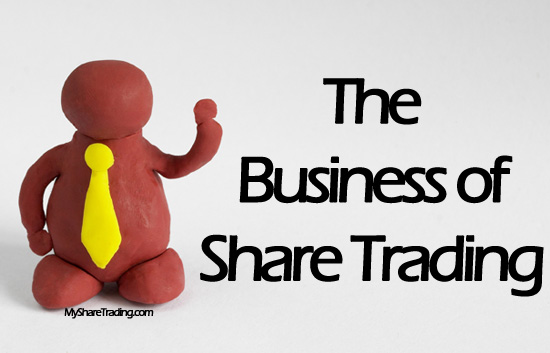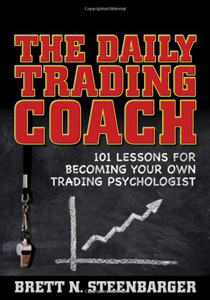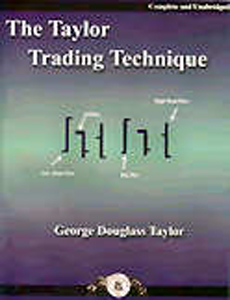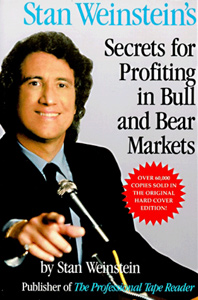The Business of Share Trading

Further Reading
Many traders have taken their hobby-like pursuit of amateur trading to the next level. They've decided to go full time (or part time) and start share trading professionally. If you undertake share trading at any level, everything discussed below should be very relevant to you. If you take your money seriously, a trading plan is always a good idea as well as keeping good records and considering taxation implications.
Business Plan: Share Trading Plan
Before you set out on trading (or investing), it's always a good idea to know and plan what you want to get out of it. What are your goals? What level of risk are you prepared to take? What level of risk can you afford to take? What is your personal risk profile? Are you a risk taker or are you risk averse? Are you young or old? (if you are young you may be able to "afford" a larger loss than someone who is late in their career) At this time, its best to seek advice from your professional financial planner or accountant to discuss these options specific to your own financial circumstances.
Once you know what your overall financial and share trading goals are and your risk tolerance you can start to chart out your share trading plan. Your share trading plan is your business plan for your share trading business. It would contain your trading strategy (technical indicators and other relevant fundamentals) and document your stop loss rules, profit targets. It would also contain details on which market and security you prefer to trade such as Australian ASX stockmarket, American markets, vanilla stocks, forex, derivatives like CFDs, options or warrants, etc.
You may also want to document the type of stocks you like to target. What behaviour would they be exhibiting when you enter? Is it a breakout strategy when the stock's price leaps through an upper resistance level? Or is it a dividend strategy, buying before an ex-dividend date? Would you only buy stocks which are in the ASX100/ASX200 or All Ordinaries index or are you open to buying speculative stocks which lack liquidity and active trading?
A well-run business is recommended to have a business plan. It maps out their strategies and plans which hopefully would help the business reach their planned destination. Similarly in trading, having a plan would hopefully build in discipline in your trading, helping you make wise decisions while avoiding temptations and impulsive decisions.
Keep Records of Your Trades
It's a good idea to invest some time in keeping good records. This means finding a place to jot down your trades and keeping track of your equity curve. Most people keep a trading journal in an excel spreadsheet which keeps track of their trades' entry price and (planned and actual) exit price, trade date, what strategy they utilised in the trade, a column for personal comments (any tips to self to do better next time or kicking self for a badly executed trade). The spreadsheet also keeps track of overall trading capital, account draw down and equity curve. Having this spreadsheet will help you keep you trading in a business-like professional manner.
Share Trading Taxation Considerations
Keeping records of your trades is especially important for taxation purposes. You'll want to pay the right amount of tax but also be able to claim for any eligible losses and deductions. Disclaimer: This information is for basic general information purposes only and is not advice and may not be up to date and current. It is best to seek professional advice from your taxation professional for advice relating to your individual financial circumstances.
If you are an Australian resident, you are taxed on all income, whether it comes from international or local sources. Therefore, any income or profits you make from trading will be taxed. In terms of trading, you can profit from an income from dividends or from capital gains realised from profitable trades.
The Australian Tax Office (ATO) recognises both share traders and share investors and even has a page called Carrying on a business of share trading which lists the conditions to have your trading activities seen as a business activity. The conditions listed are:
- the nature of the activities, particularly whether they have the purpose of profit making
- the repetition, volume and regularity of the activities, and the similarity to other businesses in your industry
- the keeping of books of accounts and records of trading stock, business premises, licences or qualifications, a registered business name and an Australian business number
- the volume of the operations, and
- the amount of capital employed.
Your trading profits will always be taxed at the highest applicable tax rate applicable to your taxable income. Whether or not you are seen as a trader conducting a business your profits will always be taxed! There is a capital gains tax discount of 50%, but this only applies if you've held your CGT assets (shares) for at least 12 months, and it may not apply to you at all if your stock trading is seen as a business and your stock viewed as "inventory" by the ATO.
Everyone loves deductions and share trading comes at a cost. Brokerage costs add up, as well as subscriptions to magazines, trading signals and trading feeds. There are also costs related to software and equipment like computers, phones, internet, etc. Generally, if you are seen as a professional trader running a business, these should be tax deductible. For share investors, the brokerage cost will form a part of the asset cost base. If you have an overall loss for the year, it may be seen as a business loss or a net capital loss which may be carried on and applied to the next year. For more information about share trading tax deductions and losses, please seek professional advice from your accountant or tax professional.
A list of helpful pages and resources from the Australian Tax Office for share traders and share investors:
- ATO Guide to Investment, includes information about investment tax planning, record keeping, shares, trusts and capital gains.
- ATO: Carrying on a Business of Share Trading
- How does the ATO classify a professional trader and an investor?
- The difference between a share trader and a share holder.
- Examples of the difference between a share trader and a shareholder.
- Common Taxation Mistakes by Shareholders
- Guide to Capital Gains Tax 2011-12
- How to Trade Forex and Gold Options
- How to Trade the Gold Price and Profit!
- Forex Trading the EUR/USD Pair € EURO and $ US Dollar
- How to Trade Stock Market Indices S&P500
- How to Trade Crude Oil
- Forex Trading Psychology
- What Are Broker Recommendations?
- Free Tickets to Trading & Investing Seminar & Expo ($18) Brisbane 2013
- Stock Calc App
- All About Warrants
- Introduction to Exchange Traded Funds
- Introduction to Exchange Traded Funds: Features
- Introduction to Exchange Traded Funds: Domestic ETFs
- Introduction to Exchange Traded Funds: International ETFs
- Exchange Traded Commodities
- Australian Stock Scan
- Australian Online Share Trading
- List of Trading Books
- Interesting Thoughts about the Australian Dollar
- What's the Meaning of Hawkish?
- Do You Know How To Use the P/E Ratio
- Trading, Religion and Politics - Do They Have Anything in Common?
- Shares that are Volatile that Double and Half in the Short Term
- Telstra (TLS) T3
- Margin Call by E-mail
- The Cost of Holding a Position
- Lack of Disclosure: Compensation from ASX Listed Company
- Unrealistic Returns and Benchmarks
- CMC Markets Down
- Quality versus Quantity Forex Trading
- Woolworths 1H Sales $30.7bn up 3.2%
Date added 31-01-2013 - ASIC Fines CommBank's CommSec
Date added 25-09-2012 - Industry Super Network Calls to Ban High Frequency Trading (HFT)
Date added 22-09-2012 - NAB Launches Online Share Trading Platform
Date added 19-09-2012 - Reserve Bank of Australia Says 23 Countries Holding AUD
Date added 18-09-2012 - Australia Post Digital Mailbox
Date added 10-09-2012 - Winners and Losers of Trading for Week 2
Date added 16-01-2012 - 2012's First Week of the Best and Worst Traded Stocks
Date added 09-01-2012 - 2011's Last Best and Worst Traded Stocks
Date added 05-01-2012 - Best and Worst Pre-Christmas Traded Stocks
Date added 30-12-2011 - Trading Winners and Losers for Dec. 12-16
Date added 19-12-2011 - Best and Worst Traded Stocks for Dec. 5-9
Date added 13-12-2011 - Top 3 Best and Worst Traded Stocks
Date added 05-12-2011 - ASX Glitch Trading Halt
Date added 27-10-2011 - Worst Trade Stocks (and the Best)
Date added 06-08-2011
Top 150 Public Companies Listed on the Australian Stockmarket as at 29/05/2009
- BHP Billiton
- Westpac Banking Corporation (WBC)
- Commonwealth Bank of Australia (CBA)
- National Australia Bank (NAB)
- Telstra (TLS)
- ANZ
- News Corporation (NWS)
- Woolworths Limited(WOW)
- Woodside Petroleum Limited (WPL)
- Rio Tinto
- Westfield Group (WDC)
- Westfarmers Limited (WES)
- QBE Insurance
- CSL
- Newcrest Mining Limited (NCM)
- Origin Energy Limited (ORG)
- Santos Limited (STO)
- AMP Limited (AMP)
- Macquarie Group (MQG)
- Foster’s Group Limited (FGL)




